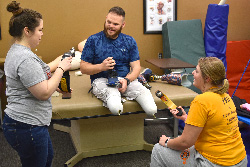Laura Schwanebeck, director of the PTA program and instructor, said the work took place as part of neurologic rehabilitation session covering amputee rehab.
“These gentlemen have graciously donated their time coming in to our lab and allowed our students to perform assessments of strength, range and motion, as well as residual limb wrapping. It really has been a great day.”
Schwanebeck had worked with one of the men, Mark Claussen, of Norfolk, in a clinic before she came to Northeast. Claussen has participated in the lab for several years and has donated several of his prosthetic components to the program.
The others were Justin McMahon, who works as a paramedic in Yankton, SD, and is also a graduate of Northeast’s Pre-Professional Nursing program, and Danny Whitlock, of Jefferson, SD, a retired drafting instructor at Northeast’s extended campus in South Sioux City.
Schwanebeck said the week of lessons began with a lecture and lab where students began to “learn it.” She said once they understand it, they get to actually to apply it right away to a patient.
“The light bulbs come on a ton as they work with real life patients. The feedback I get from them is always, ‘Do not get rid of this experience!’” The more we can bring patients in like Danny, Jason and Mark and demonstrate real world situations, the better it is for the students. It really makes them connect to what they will encounter when they become employed.”
The three men were engaging with the students. Schwanebeck said all could talk for hours, “so that makes it much easier for the students as well.” She said they answered every question the students had and were very open about their injuries or circumstances.”
Labs are split in half when the men are on campus, so there are not too many students working with them at a time.
“This allows for a better ratio between the instructors, students and patients. Eight students worked with the patients in the morning while the remaining seven were in the afternoon,” Schwanebeck said.
Physical Therapist Assistant is a two-year program at Northeast Community College with a selective admissions process. Students learn how to work in all rehabilitative settings. In acute care, such as a hospital, they are instructed on how to get a patient in and out of bed and how to get them from a
bed to a wheelchair, among other lessons.
In addition, students demonstrate to patients how to walk on crutches on stairs or with a walker on level surfaces. Hands on techniques include how to test range of motion, which is primarily in an outpatient setting, and how to take vital signs on patients with cardio pulmonary concerns.
PTA students also involve themselves with pediatric patients in the lab in order to gain additional hands on and realistic experiences in working with younger patients in a clinical setting.
Schwanebeck said it is important to have a balance between lectures in the classroom and lab work. She said it allows the students to learn in the classroom and carry out the practice in the lab while working with fellow students or patient volunteers.
“That’s when they really learn the hands on techniques and it really make sense to them. They figure it out and say, ‘Oh, this is how you treat the patient and this is why it works.’”
--###--
PHOTO CUTLINE
Northeast Community College Physical Therapy Assistant students Katie Muehlmeier, of Norfolk, (left) and Sarah Prohaska, Prague, visit with Jason McMahon, of Yankton, SD, during a neurologic rehabilitation session in the program’s lab recently.

